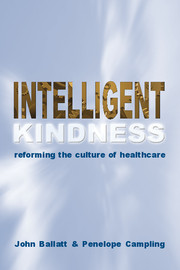Book contents
7 - On the edges of kinship
from Part II - The struggle with kindness
Published online by Cambridge University Press: 01 January 2018
Summary
The fault in aliens is that those easiest to exploit are the hardest to assimilate
(Anonymous)Powerful political and psychosocial processes influence the extent to which society recognises and responds to its members as kin. There are difficult ‘edges’ at which goodwill and rejection compete for dominance in the public mind. Healthcare staff are frequently working at these edges, which complicate the ‘self-overcoming’ involved in any form of healthcare work (see Chapter 4, p. 54). Sometimes the dilemma is pretty obvious – the violent drunk haemorrhaging in an accident and emergency department inevitably arouses conflicting responses; the heavy smoker in need of a lung transplant confronts us with mixed feelings. The continued, often dangerously fluctuating, needs of people with long-term conditions persist in frustrating our instinct and wish to remove suffering and can wear us down. Generosity, and the instinct to turn away, to deprive, even to punish, vie for dominance in our thinking.
These ‘edges of kinship’ are sometimes much more complicated. They may involve attitudes to people who come from ‘outside’ our geographical and social boundary – such as migrants and asylum seekers. Just as significantly, other such ‘edges’ involve the needs of people who are objectively already part of our national ‘kin’ – such as people with profound intellectual disabilities, mental health problems, the old and the dying.
Such groups can arouse inclusive, generous and compassionate responses. They have the capacity, though, to evoke feelings of fear and the wish to reject or deny either things about others or, at the deepest level, about ourselves. The refugee evokes ‘indigent’ anxiety and competitive feelings about possessions, security, work, identity, culture. The dying person evokes helplessness in the healthy, and profound fears and rage about an inescapable and frightening reality; the person with an intellectual disability, a fear of dependency and difference; the psychotic individual, a fear of their disturbance and of our own madness. These feelings are, of course, not restricted to healthcare. They reflect wider social uncertainty, complexity of feelings, division and discrimination. They reflect profound anxieties about the extent of our resources, material and emotional, and where they should be invested. They confront us all with the limits to our generosity and fellow feeling.
- Type
- Chapter
- Information
- Intelligent KindnessReforming the Culture of Healthcare, pp. 100 - 114Publisher: Royal College of PsychiatristsPrint publication year: 2011



